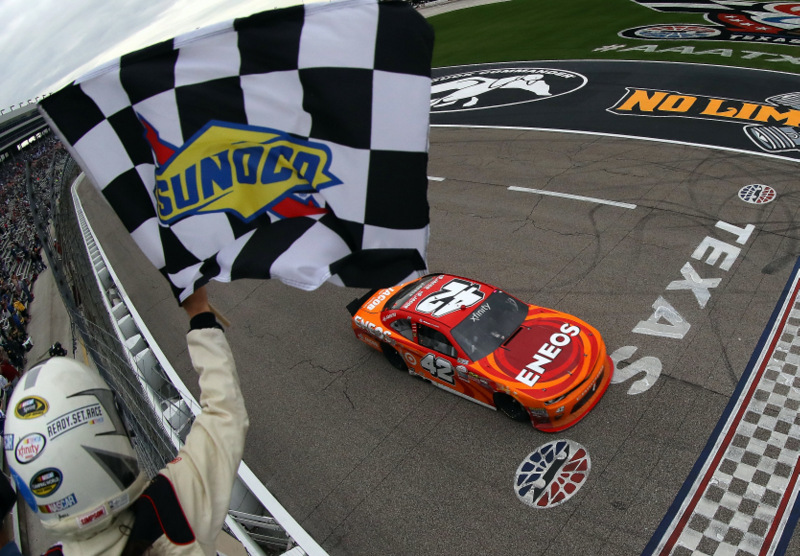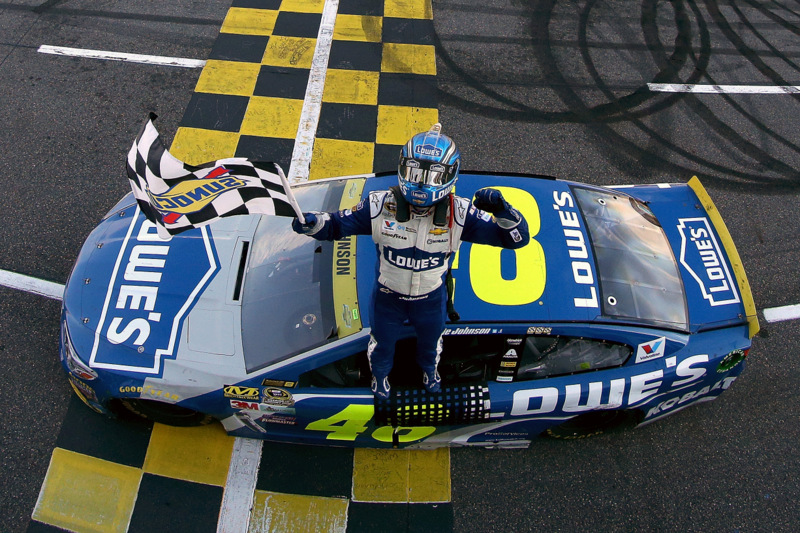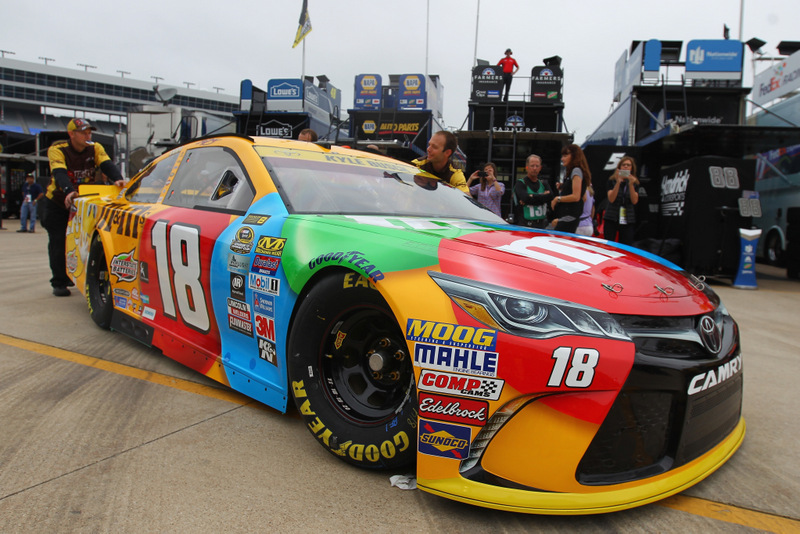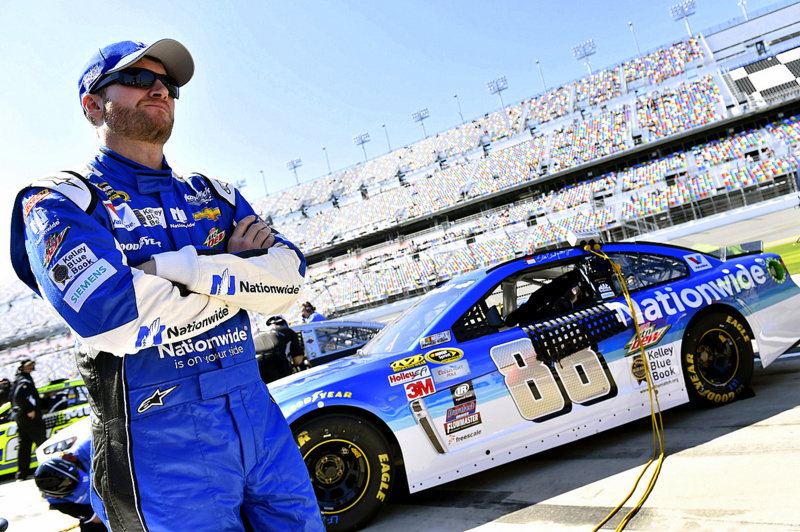NASCAR Announces New Stage-Based Race Structure And Playoff Points System
Story By: REID SPENCER / NASCAR WIRE SERVICE
Photos By: GETTY IMAGES /NASCAR
 CHARLOTTE, N.C. –January 24, 2017- NASCAR has a new race structure and playoff points system, one that, in the words of Chairman and CEO Brian France, is designed to “make racing more compelling on an hour-by-hour basis, week in and week out.”
CHARLOTTE, N.C. –January 24, 2017- NASCAR has a new race structure and playoff points system, one that, in the words of Chairman and CEO Brian France, is designed to “make racing more compelling on an hour-by-hour basis, week in and week out.”
There are two fundamental enhancements, announced on Monday at the Charlotte Convention Center and covering all three of NASCAR’s national series, that should promote that goal.
First, races will be divided into three stages each, with the number of laps in each stage determined in advance according to the race length and the venue. The top 10 drivers in each of the first two segments will score championship points—10 to the winner, nine to second place, eight for third, and so forth.
The race winner (the driver who takes the checkered flag at the end of the final stage) gets 40 championship points, second place earns 35, with each succeeding position worth one point less.
In addition—and this is the second major innovation for 2017—the winners of the first two stages earn one playoff point each, and those points are carried forward throughout the first three rounds of the 10-race playoff at the end of the season.
 The race winner receives five playoff points, which also carry forward until the season-ending Championship 4 race at Homestead-Miami Speedway, where points are reset to zero and the highest-finishing driver among the four who are eligible for the title claims the championship.
The race winner receives five playoff points, which also carry forward until the season-ending Championship 4 race at Homestead-Miami Speedway, where points are reset to zero and the highest-finishing driver among the four who are eligible for the title claims the championship.
The changes involved extensive discussion and collaboration between industry stakeholders, including the sanctioning body, team owners, the drivers and broadcast partners.
“There are no off weeks,” said Denny Hamlin. “Every single race matters. … Not only that, but every lap of every race matters. From our standpoint, you always felt a little bit relaxed once you got a race win, and you would sometimes maybe go into test mode or something. Now with each accomplishment that you have during each given race, whether you’re collecting points for the overall regular season or you’re trying to collect points through a stage win or a race win, each accomplishment gives your road to Homestead a little bit easier, gives you a little bit of cushion there to be able to get through the playoffs and make it to Homestead. And that’s what it’s all about for us is making it to Homestead and trying to race for a championship, and I think this format does it for it.”
No longer will NASCAR racing have a “Chase.” Henceforth, “playoff” will be the operative term for all three series.
“We introduced a new word, i.e., the Chase, and we liked it at first,” said NASCAR Executive Vice President and Chief Racing Development Officer Steve O’Donnell. “But when you really talk about it, when (a team owner) is out talking to a sponsor, well, what’s the Chase? Well, it’s our playoffs.”
There are many aspects of the formats that won’t change. Race winners will still qualify for the playoffs, as they have since NASCAR introduced the elimination format in 2014. But under the new system, drivers will still have a strong incentive to accumulate playoff points that will carry forward through the first nine races of the playoff, because those points could be critical to advancement.
 “I look at races as soon as the plate tracks, especially Talladega, and you might have seen cars that have lagged back in the past,” said Brad Keselowski. “You’re not going to do that anymore. The single file, high line ride out, those days are gone. And I think that’s great. We’re going to go out there and we’re going to race to a new level that we haven’t seen before, and I’m really pumped about being a part of that in the future of this sport.”
“I look at races as soon as the plate tracks, especially Talladega, and you might have seen cars that have lagged back in the past,” said Brad Keselowski. “You’re not going to do that anymore. The single file, high line ride out, those days are gone. And I think that’s great. We’re going to go out there and we’re going to race to a new level that we haven’t seen before, and I’m really pumped about being a part of that in the future of this sport.”
The number of drivers in the Monster Energy NASCAR Cup Series playoff will remain at 16. Playoff fields in the NASCAR XFINITY and Camping World Truck Series will remain status quo at 12 and eight drivers, respectively.
Winning a race is still a ticket to the next round of the playoff—guaranteed.
But under the new system, the regular season winner also provides an opportunity to earn playoff points without winning stages or races. The championship leader after 26 races receives 15 playoff points. Second place gets 10 points, third place eight, with each successive position worth one point less through the top 10 positions.
Like the points for stage and race wins, those earned for top-10 regular-season finishes carry forward through the Round of 8, which concludes at Phoenix.
 Though there will be more to process and digest, Earnhardt believes the race fans who drove the changes to the race structure and playoff points will embrace the changes.
Though there will be more to process and digest, Earnhardt believes the race fans who drove the changes to the race structure and playoff points will embrace the changes.
“I think the change is actually very subtle,” Earnhardt said. “Basically, you’re going to throw two cautions. You’re going to know when they are, which is actually kind of comforting. Who wins the race, and how the races are decided doesn’t change.
“The playoff doesn’t really change at all. You’re going to have two breaks in every race that essentially are going to be rewarding to your driver. That, to me, creates interest.”
Note: Overtime will still be in play at the end of races, but not at the end of stages, but NASCAR has eliminated bonus points for leading laps and leading the most laps.


















































